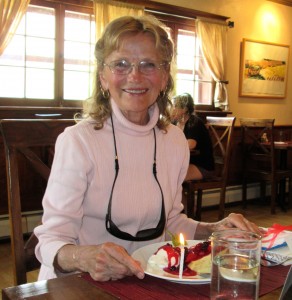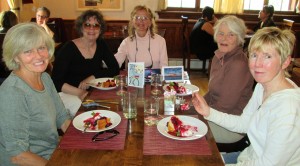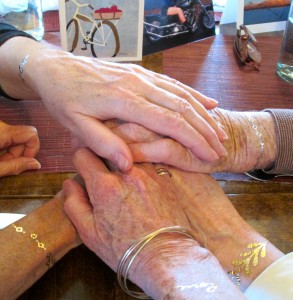One of the many important lessons I learned from the women I came to know and admire in my nearly three years living and working in Segou, Mali, was this: the necessity of celebration. These smart, beautiful, resourceful Malian women knew, in a way I had yet to learn, that despite all – despite life’s hardships and trials, challenges and sorrows – sometimes you’ve just got to get together and celebrate.
I remember watching them at their women’s center fêtes. The older women wore more dazzling and dramatic traditional dresses than the younger women did. And in their line dances it was the older women who led the procession, keeping the beat, initiating the dips, claps, and steps, while the younger women followed their every move. For music they relied on a battery-powered radio; or if that was not available, one of the women used an upside-down cardboard box as a drum. They taught me by example that celebration helps to balance life’s scales. Before too long, I began to dance with them.
A friend here in Taos whose 70th birthday is close to mine confessed she was reluctant to have a party, in light of the recent heart-rending events in Nepal and elsewhere. My thoughts were: You must celebrate.
“Celebration,” said Rabbi Abraham Joshua Heschel, a leading 20th century Jewish philosopher, “is an active state, an act of expressing reverence or appreciation. To be entertained is a passive state – it is to receive pleasure afforded by an amusing act or a spectacle. … Celebration is a confrontation, giving attention to the transcendent meaning of one’s actions” (The Wisdom of Heschel).

So, acting on my Malian women friends’ example, and Heschel’s wise counsel, I, along with four dear friends, celebrated my 70th birthday this week at Ojo Caliente, a nearby mineral springs resort and spa, to rejuvenate ourselves and to balance our scales. While there for the day, I asked each of them for their thoughts on celebration.
“My feeling about celebration has evolved over time,” Judy told me. “When I was young, it felt more like putting a mark on the next year or somebody’s graduation…. But as I’ve aged, I’ve found that it’s absolutely necessary to find celebration every day. The way I do that in my own life is to look for it – to wake up every morning and think, ‘This [new day] is something to celebrate!’”
My friend Barb feels that the best celebrations are the simplest ones, like the one we were having at Ojo. When an event is large, expensive, and long in the planning process, it can turn out to be anticlimactic, “a big letdown,” she said. Her advice: “Keep it simple.”
Cherie, too, feels that simple and spontaneous celebrations are best. “One of the best birthdays I ever had,” she said, “was when the weather just happened to be right and we had a spur-of-the-moment picnic. It was terrific!”
For Janet, the defining element of any celebration is laughter. Whether it’s a birthday party or a funeral, “there needs to be laughter,” she said. “You’ve got to find the irony in the situation. Turning 70 years old, for instance; you’ve just got to laugh.”

When the five of us applied the gold and silver “Lulu” tattoos Cherie had given me for my birthday to our wrists at the table in the resort’s restaurant while waiting for our lunch to arrive, people at nearby tables stared at our antics. We were laughing like little girls.

[For more about the wonderful Malian women I lived among and worked with, please read my book, How to Make an African Quilt: The Story of the Patchwork Project of Segou, Mali (Nighthawk Press, 2013.)]
